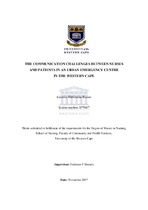The communication challenges between nurses and patients in an urban emergency centre in the Western Cape
Abstract
BACKGROUND: The perceptions of the communication, between patients and nurses in an
urban emergency centre of a district hospital, were explored to identify the challenges.
PURPOSE: The aim of the study was to explore the challenges hindering effective
communication between patients and nurses, as well as propose possible improvement
strategies for effective communication.
METHODOLOGY: A qualitative, exploratory and descriptive design was applied in this study.
Data was collected through in-depth interviews with patients and nurses. The analysis of the
data was performed, using the inductive thematic analysis, which aligned the emerging
themes, with the four principles of the Patient-Centred Communication Model (PCCM).
FINDINGS: The research observed that patients and nurses perceived various challenges to
affect the manner in which professional nurses communicated with patients in the emergency
centre and overnight ward. These challenges, such as increased patient numbers and skills
shortages, under which the professional nurses have to perform their patient-care duties, had
a negative effect on communication.
PRACTICE IMPLICATIONS: The research revealed an overwhelming need for further research of
all the challenges, resource limitations, as well as staff capacity and skills that influence the
communication between patients and nurses. The strengthening of the work place model
PCCM, to promote a friendly, accepting and warm environment, which will contribute to the
positive health outcome of the organisation, was recommended.

